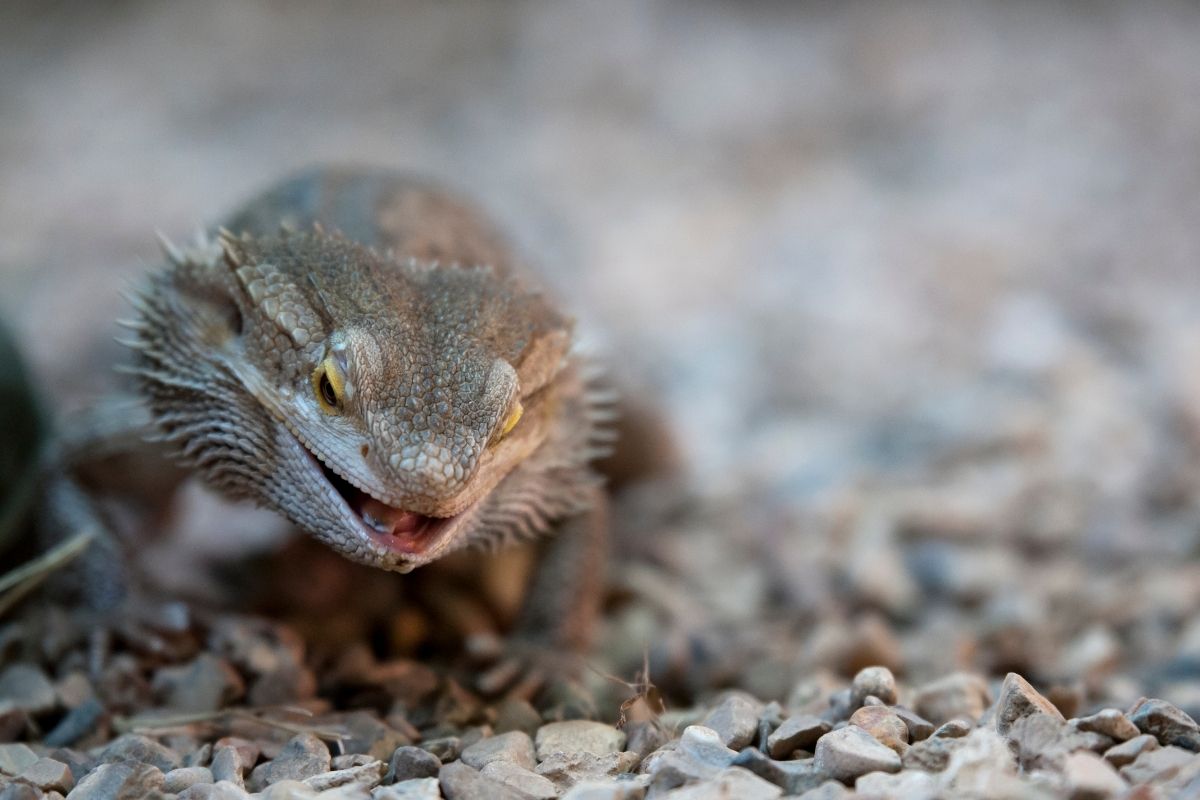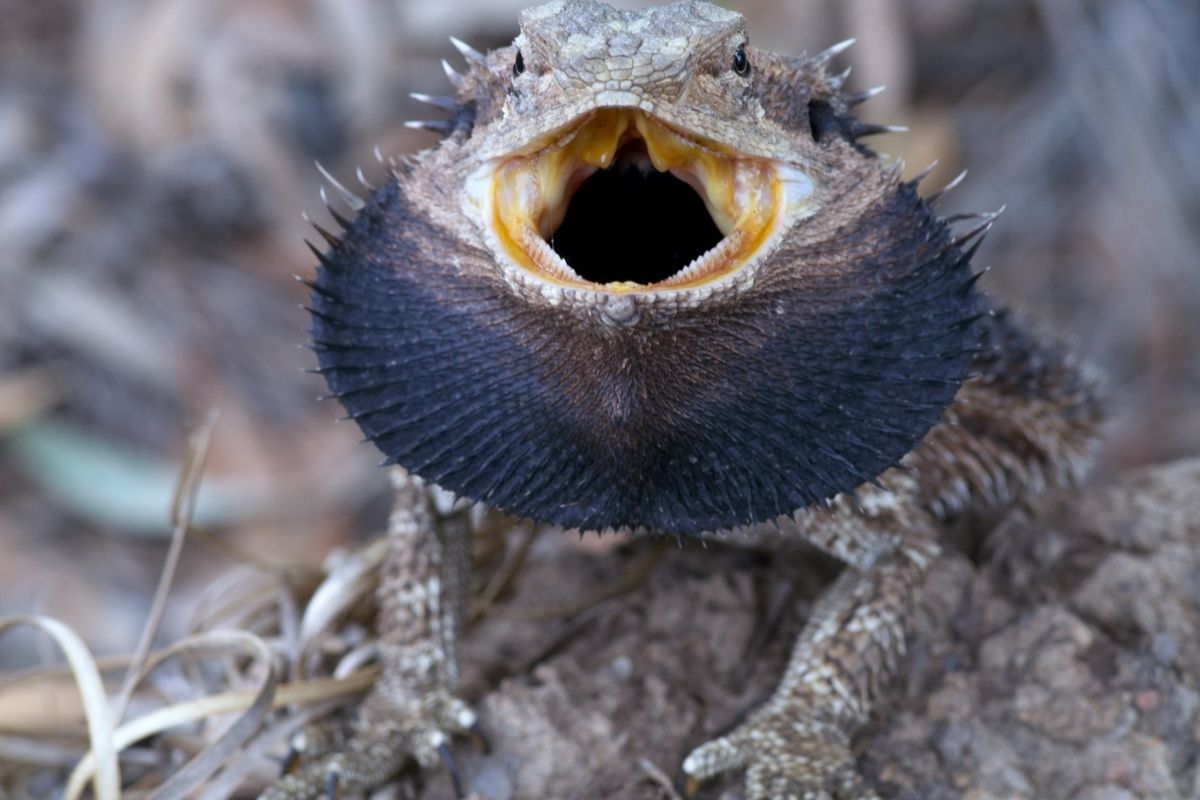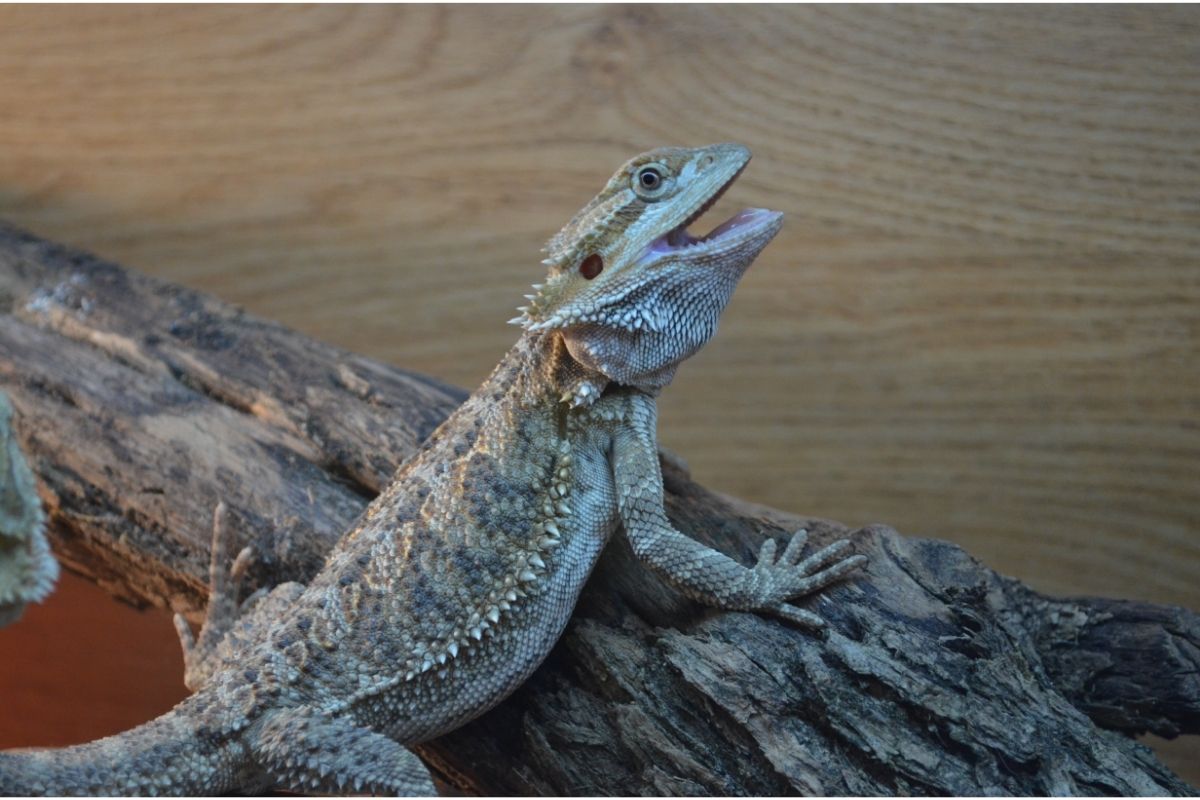Bearded dragons are one of the most popular reptiles to own as pets in the world.
These beloved lizards are known for their easy care requirements, fascinating appearance, and placid behavior.

However, like all reptiles (and all animals, for that matter), there’s always a risk of getting bitten.
After all, we’ll never truly know what’s going on in a reptile’s instinctual head, and if they’re on the hunt for food, they might accidentally mistake your finger for grub.
The question is – do bearded dragons bite?
If you’re looking into adding a bearded dragon into your family or if you’re merely curious about the species, here is everything you need to know about whether bearded dragons can bite!
So, Do Bearded Dragons Bite?
To put it simply, yes – bearded dragons have the ability to bite.
Whether you’re likely to be bitten by a bearded dragon or not is another question.
Bearded dragons are notoriously placid and docile lizards that are typically grown up alongside humans.
Breeders like to handle bearded dragons from a young age to get them used to human hands and smells to reassure them that humans don’t pose a threat.
As a result of this, the likelihood of your bearded dragon biting you is pretty uncommon.
However, this doesn’t mean that a bearded dragon doesn’t have the ability to bite, as they do possess teeth.
Do Bearded Dragons Have Teeth?
Like the vast majority of reptiles, bearded dragons have teeth.
However, unlike humans, bearded dragons are born with a full set of teeth to help them munch and digest fruits and vegetables as a baby.
Depending on the lizard, a bearded dragon will typically possess 11-17 teeth on both sides of their upper jaw, and 13-20 on both sides of their lower jaw.
Their teeth are very small and pointed like a triangle, allowing them to easily cut through food.
Will My Bearded Dragon Bite Me?
It’s not easy for us to say whether your bearded dragon will bite you or not because we don’t know the behavioral patterns of your bearded dragon.
We also don’t know its upbringing, which is the main factor in determining your lizard’s aggression levels.
Despite its somewhat threatening name, bearded dragons are calm and gentle reptiles that don’t have a tendency to bite.
The only reason they might bite (or try to bite) you is if they feel threatened or afraid.
As with the majority of reptiles, biting is the most common form of self-defense when it comes to bearded dragons.
If you are poking their head or taunting them in any way with your fingers, there’s a chance you might get bitten.
This is because your bearded dragon is feeling provoked and wants their own space.
Whether your bearded dragon will bite you or not also depends on its upbringing.
Fortunately, most reptile stores and breeders will introduce handling at a young age, allowing bearded dragons to become accustomed to human interaction virtually from day one.
As a result of this, bearded dragons don’t typically see humans as a threat.
They will have also mostly learned to distinguish the difference between human fingers and their food.
Putting it simply, you shouldn’t worry about the chances of your bearded dragon biting you.
If you treat your bearded dragon with respect and frequent handling, they shouldn’t show any signs of aggression.
How Do Bearded Dragon Bites Feel?

If you are on the unfortunate receding end of a bearded dragon, you should know that the bite itself doesn’t actually hurt that bad.
Bearded dragons might have a lot of teeth in their jaws, but the teeth are very small, and their jaw power isn’t nearly as strong as other reptiles.
Even if your bearded dragon does bite you, it might only draw the smallest amount of blood.
If anything, it’s only going to feel like a brief nipping sensation.
Luckily for you, the shock of a bearded dragon bite is typically worse than the bite itself.
It’s never nice to be bitten by a pet – particularly a lizard if you are afraid of them – but a bearded dragon isn’t going to cause any serious injuries.
The worst-case scenario?
The bearded dragon might break the skin and draw a bit of blood, which can be fixed by cleaning the “wound” and wrapping a band-aid around it.
However, the pain levels of a bite depend on two factors – your pain tolerance and the age of the bearded dragon.
If you have a particularly low pain tolerance, you might find a bearded dragon bite slightly painful if they bite a sensitive area like a fingertip.
As expected, the bite force of a baby or juvenile bearded dragon will hurt far less than a bit from an adult bearded dragon.
This is purely because young bearded dragons don’t have enough strength or muscles in their jaw to pierce human skin, let alone draw blood.
Why Do Bearded Dragons Bite?
Due to their placid behavior, bearded dragons won’t bite for no reason at all.
It is, therefore, important to understand why a bearded dragon might bite to prevent it from happening again in the future.
Here are the main reasons why your bearded dragon might bite:
You’re Not Handling It Properly
The biggest reason why bearded dragons (among virtually every pet reptile) might bite you is because you’re not handling it properly.
While bearded dragons are docile creatures, inexperienced owners might accidentally mishandle this lizard because they don’t know how to hold one.
This is why it’s important to ask the breeder or reptile store lots of questions about handling your dragon before you take it home.
Unfortunately, mishandling is the main reason why children can be bitten by bearded dragons.
Children will get overexcited when handling a bearded dragon, whether it’s out of nervousness or the pride in showing their friends their cool pet.
Overexcitedness can lead to your bearded dragon feeling uncomfortable and unsafe, leading to a potential bite.
It is, therefore, important to teach a child how to handle a bearded dragon properly.
Holding a dragon doesn’t actually take much skill, but you must ensure that the child is calm, relaxed, and free from tension before holding one.
It’s also good to teach a child about boundaries with animals.
Humans generally don’t like being poked in the face, and the same goes for bearded dragons.
After all, a bearded dragon might bite if they are feeling uncomfortable or if they’re being hurt from mishandling.
To ensure a happy and trusting relationship with your bearded dragon, it’s important to not mishandle it.
Your Bearded Dragon Hasn’t Been Tamed
Sadly, not all bearded dragons are tamed from a young age.
In the rarest of cases, you might have unknowingly bought your bearded dragon from a breeder or reptile store that hasn’t handled the lizard from a young age.
This can lead to a sense of mistrust, often resulting in aggressive behavior such as biting and scratching.
This is only as a result of a lack of taming, and it can take far longer to tame an adult bearded dragon than a baby one.
Because of this, it’s vital that you purchase your bearded dragon from a reputable breeder or reptile store that has handled the dragons from a young age.
We recommend visiting the bearded dragon of your choice once or twice before buying it to see how it reacts to human handling.
If the bearded dragon seems restless, agitated, or particularly fast in their movements, this might be a sign of limited taming.
Unless you are prepared to tame the dragon yourself, it’s far easier for beginners to buy a bearded dragon who is used to human contact.
It’s Mating Season
The mating and breeding season for bearded dragons is typically around spring and early summer, marking the end of their hibernation season.
If you have a female bearded dragon who has bitten you around this time, odds are she has fully matured and is looking for a mate.
Biting from a female bearded dragon is sometimes because she’s looking to get…frisky.
Alternatively, she might be feeling particularly territorial and hormonal.
During this time, it’s best to leave her alone.
Half of the time, however, she might not bite you at all.
She might exhibit other signs of distress, however, such as restlessness and trying to move back into her vivarium when you’re handling her.
However, male bearded dragons are also known to become territorial during the mating season.
When trying to impress a female dragon, their egos become larger than life to prove that they are dominant.
Again, while it’s not common, you might be on the receiving end of a bite before this.
They’re Feeling Threatened

Despite their name, bearded dragons aren’t fearless reptiles.
Some bearded dragons can be shy when you reach your hand into their vivarium, making them feel threatened or intimidated.
When a bearded dragon feels threatened, they will typically run to a small or hidden spot to hide from the predator.
Other signs include puffing their beards up and darkening their chests (hence the name “bearded”), hissing, and even bobbing their heads.
These actions can also be a sign of looking for a mate (as mentioned before), introducing another bearded dragon to their vivarium, or feeling threatened by a new object.
Essentially, anything that could be mistaken for a larger predator can lead a bearded dragon to bite, though this is usually a last resort.
To aid their anxieties, it’s good to clutter parts of the vivarium with hiding spaces such as caves and foliage to make them feel more safe.
They’re Hungry
While this isn’t a common occurrence at all, your bearded dragon might accidentally mistake your fingers for their food.
If you feed your dragon by hand, they might accidentally nip you as they grab their food.
Luckily, this is never a full bite because they only need enough jaw power to grab the food before chewing it.
This is most common with baby and juvenile dragons who get overexcited about eating.
After regular feeding, they will eventually learn the difference between their food and your fingers.
It is always recommended to feed your bearded dragon with a pair of feeding tongs to prevent bites.
These tongs are long enough to handle food at a safe distance, ensuring that your dragon won’t accidentally bite you.
They’re also handy for reaching your dragon at the back of the vivarium.
Other than using feeding tongs, the best way to prevent your bearded dragon from accidentally biting you when they’re hungry is to commit to a regular feeding routine.
Unlike other reptiles (Ball pythons, for example), bearded dragons are fantastically reliable feeders who will eat just about anything you offer it.
Committing to a frequent feeding schedule will set them into a rhythm of when to expect food.
Treating A Bearded Dragon Bite
If you are bitten by a bearded dragon, you should first know that bearded dragon bites aren’t poisonous.
Don’t bother calling the Emergency Room; you can treat a bite at home – no amputation needed!
Whether the bite has pierced the skin or not, the first thing to do is clean the area with an antiseptic wipe.
These can be found in all basic first aid kits.
The reason you should clean the area regardless of the level of the bite is because all reptiles carry bacteria, which can easily be spread through bites.
This is why you should wash your hands before and after handling a bearded dragon anyway.
If the bite has broken the skin, you should wrap a band-aid around it to keep any bacteria away from it.
Just treat it in the same way as slicing your finger with a cooking knife.
In the exceedingly rare occurrence where the bite becomes infected, you might want to speak to your doctor about antibiotics.
In Summary
So, there you have it! You shouldn’t be too worried about bearded dragon bites.
There’s a reason why these lizards are so popular amongst beginner pet owners – their docile and gentle nature means they aren’t prone to biting.
Hopefully, this guide will have put your mind at ease and answered any questions about why a bearded dragon might bite.
Frequently Asked Questions
Do Bearded Dragons Bite When You Pick Them Up?
Fortunately, bearded dragons are placid and docile reptiles that are used to being held by humans from a young age.
However, this doesn’t mean there’s a 100% chance they won’t bite you.
If a bearded dragon bites you when you’ve picked it up, it can be a sign of distress, pain from mishandling, discomfort because it’s mating season, or they simply might not want to be held.
Luckily, your bearded dragon is most likely to exhibit other signs that will tell you not to handle it at the time, including running to a hiding spot, hissing, puffing up their beards, and darkening their chests.
Does It Hurt If A Bearded Dragon Bites You?
It doesn’t hurt too much if a bearded dragon bites you.
Their teeth are small, and they don’t typically have the jaw power to cause a deep wound.
Depending on your pain tolerance, a bite from a bearded dragon will most likely feel like a nibble.
